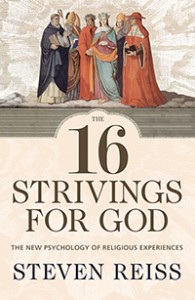Welcome to DU!
The truly grassroots left-of-center political community where regular people, not algorithms, drive the discussions and set the standards.
Join the community:
Create a free account
Support DU (and get rid of ads!):
Become a Star Member
Latest Breaking News
General Discussion
The DU Lounge
All Forums
Issue Forums
Culture Forums
Alliance Forums
Region Forums
Support Forums
Help & Search
Religion
Related: About this forumAre All Religious Experiences Reducible to 16 Desires?

The 16 Strivings For God: The New Psychology of Religious Experiences
Steven Reiss
Mercer University Press
(January, 2016)
By Andrew Aghapour / January 29, 2016
For quite some time now, there’s been an irritating trend in the social sciences. In every generation, someone new comes along to explain how all of religion exists in order to satisfy this one particular human need.
According to nineteenth-century anthropologist Edward B. Tylor, religion arose to satisfy our curiosity about the universe. James Frazer later argued that, rather, religion indulges humanity’s need to feel like we’re in control. For Freud, religion helps us cope with our fear of death. William James argued that religion was ultimately about our need to experience mystical states of consciousness.
The problem with these approaches is that religion does a lot of different things for a lot of different people. The only way to force religion to fit a single fundamental desire is to make up your own rules about what counts as religion. This has political consequences. On the colonial frontier, for example, this logic was used to dismiss indigenous cultures as backwards, and to claim that what they called religion simply didn’t count.
Enter psychologist Steven Reiss’ new book: The 16 Strivings for God: The New Psychology of Religious Experiences. There isn’t just one fundamental desire behind religion, Reiss argues, there are sixteen of them. According to Reiss, all humans have the following innate desires:
– Acceptance: the desire for positive self-regard
– Curiosity: the desire for understanding
– Eating: the desire for food
– Family: the desire to raise children and spend time with siblings
– Honor: the desire for upright character
– Idealism: the desire for social justice
– Independence: the desire for self-reliance
– Order: the desire for structure
– Physical Activity: the desire for muscle exercise
– Power: the desire for influence or leadership
– Romance: the desire for beauty and sex
– Saving: the desire to collect
– Social Contact: the desire to have fun with peers
– Status: the desire for respect based on social standing
– Tranquility: the desire for safety
– Vengeance: the desire to confront provocations
– Curiosity: the desire for understanding
– Eating: the desire for food
– Family: the desire to raise children and spend time with siblings
– Honor: the desire for upright character
– Idealism: the desire for social justice
– Independence: the desire for self-reliance
– Order: the desire for structure
– Physical Activity: the desire for muscle exercise
– Power: the desire for influence or leadership
– Romance: the desire for beauty and sex
– Saving: the desire to collect
– Social Contact: the desire to have fun with peers
– Status: the desire for respect based on social standing
– Tranquility: the desire for safety
– Vengeance: the desire to confront provocations
Religion, he argues, is successful when it serves all of these needs.
http://religiondispatches.org/are-all-religious-experiences-reducible-to-16-desires/
InfoView thread info, including edit history
TrashPut this thread in your Trash Can (My DU » Trash Can)
BookmarkAdd this thread to your Bookmarks (My DU » Bookmarks)
3 replies, 683 views
ShareGet links to this post and/or share on social media
AlertAlert this post for a rule violation
PowersThere are no powers you can use on this post
EditCannot edit other people's posts
ReplyReply to this post
EditCannot edit other people's posts
Rec (3)
ReplyReply to this post
3 replies
 = new reply since forum marked as read
Highlight:
NoneDon't highlight anything
5 newestHighlight 5 most recent replies
= new reply since forum marked as read
Highlight:
NoneDon't highlight anything
5 newestHighlight 5 most recent replies
Are All Religious Experiences Reducible to 16 Desires? (Original Post)
rug
Jan 2016
OP
ErisDiscordia
(443 posts)1. Very interesting, thanks!
rug
(82,333 posts)2. Welcome to DU and the Religion Group!
ErisDiscordia
(443 posts)3. Happy to be here!